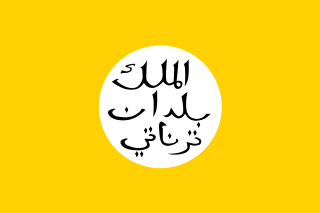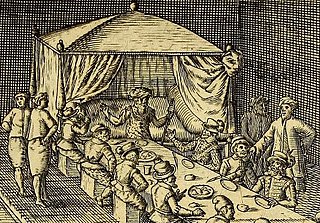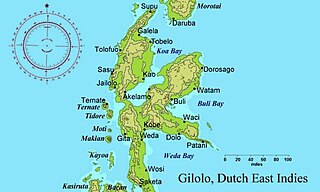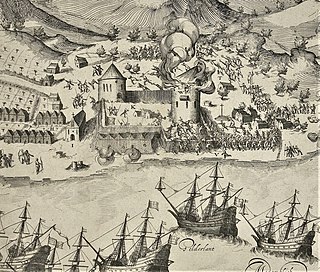Related Research Articles

North Maluku is a province of Indonesia. It covers the northern part of the Maluku Islands, bordering the Pacific Ocean to the north, the Halmahera Sea to the east, the Molucca Sea to the west, and the Seram Sea to the south. It shares maritime borders with North Sulawesi, Southeast Sulawesi and Central Sulawesi to the west, Maluku to the south, Southwest Papua to the west, and Palau and the Philippines to the north. The provincial capital is Sofifi on the largest island of Halmahera, while the largest city is the island city of Ternate. The population of North Maluku was 1,038,087 in the 2010 census, making it one of the least-populous provinces in Indonesia, but by the 2020 Census the population had risen to 1,282,937, and the official estimate as at mid 2023 was 1,328,594.

The Sultanate of Ternate, previously also known as the Kingdom of Gapi is one of the oldest Muslim kingdoms in Indonesia besides the sultanates of Tidore, Jailolo, and Bacan.

The Sultanate of Tidore was a sultanate in Southeast Asia, centered on Tidore in the Maluku Islands. It was also known as Duko, its ruler carrying the title Kië ma-kolano. Tidore was a rival of the Sultanate of Ternate for control of the spice trade and had an important historical role as binding the archipelagic civilizations of Indonesia to the Papuan world. According to extant historical records, in particular the genealogies of the kings of Ternate and Tidore, the inaugural Tidorese king was Sahjati or Muhammad Naqil whose enthronement is dated 1081 in local tradition. However, the accuracy of the tradition that Tidore emerged as a polity as early as the 11th century is considered debatable. Islam was only made the official state religion in the late 15th century through the ninth King of Tidore, Sultan Jamaluddin. He was influenced by the preachings of Syekh Mansur, originally from Arabia. In the 16th and 17th centuries, the Sultans tended to ally with either Spain or Portugal to maintain their political role but were finally drawn into the Dutch sphere of power in 1663. Despite a period of anti-colonial rebellion in 1780–1810, the Dutch grip on the sultanate increased until decolonization in the 1940s. Meanwhile, Tidore's suzerainty over Raja Ampat and western Papua was acknowledged by the colonial state. In modern times, the sultanate has been revived as a cultural institution.

The Sultanate of Bacan was a state in Maluku Islands, present-day Indonesia that arose with the expansion of the spice trade in late medieval times. It mainly consisted of the Bacan Islands but had periodical influence in Ceram and the Papuan Islands. It fell under the colonial influence of Portugal in the 16th century and the Dutch East India Company (VOC) after 1609. Bacan was one of the four kingdoms of Maluku together with Ternate, Tidore and Jailolo, but tended to be overshadowed by Ternate. After the independence of Indonesia in 1949, the governing functions of the sultan were gradually replaced by a modern administrative structure. However, the sultanate has been revived as a cultural entity in present times.

François Valentyn or Valentijn was a Dutch Calvinist minister, naturalist and author whose Oud en Nieuw Oost-Indiën describes the history of the Dutch East India Company while also making notes on geography, ethnography, and natural history; half is about the Moluccas. The work is characterised by vanity, randomness, imbalance and the lack of systematics. Valentyn even used sources that he considered unreliable shows his urge to describe the pre-colonial history of Asia as well. Some of his descriptions were far-fetched.
Zainal Abidin ; born Tidore Wonge or Gapi Buta ) was the 18th or 19th ruler of the Ternate Sultanate of Maluku, located in modern-day Indonesia. His life is only described in sources dating from the 16th century or later. According to these sources he was the first ruler of Ternate to use the title Sultan rather than Kolano, or king, and enacted a number of changes in the government, based on Islamic Law, technically transforming Ternate into an Islamic kingdom.

Sultan Babullah, also known as Sultan Baabullah was the 7th Sultan and 24th ruler of the Sultanate of Ternate in Maluku who ruled between 1570 and 1583. He is known as the greatest Sultan in Ternatan and Moluccan history, who defeated the Portuguese occupants in Ternate and led the Sultanate to a golden peak at the end of the 16th century. Sultan Babullah was commonly known as the Ruler of 72 (Inhabited) Islands in eastern Indonesia, including most of the Maluku Islands, Sangihe and parts of Sulawesi, with influences as far as Solor, East Sumbawa, Mindanao, and the Papuan Islands. His reign inaugurated a period of free trade in the spices and forest products that gave Maluku a significant role in Asian commerce.
Sultan Hairun Jamilu was the 6th Muslim ruler of Ternate in Maluku, reigning from 1535 to 1570. During his long reign, he had a shifting relation to the Portuguese who had a stronghold in Ternate and tried to dominate the spice trade in the region. This ended with his assassination at the hands of a Portuguese soldier in 1570.
Bayan Sirrullah was the second Sultan of Ternate in Maluku. He is also known as Abu Lais or Kaicili Leliatu. He ruled from perhaps 1500 to 1521 and is important as the first east Indonesian ruler who made contact with the encroaching Portuguese.
Dayal also known as Hidayatullah was the fourth Sultan of Ternate in Maluku. He had a short and largely nominal reign between 1529 and 1533 before fleeing Ternate due to Portuguese pressure. He later tried to create an anti-Portuguese alliance among the kings in North Maluku, but was mortally wounded in battle against the Europeans.

Sultan Saidi Berkat was the eighth Sultan of Ternate in the Maluku Islands. His capital and seat of power was in the city of Ternate. He succeeded to the extensive east Indonesian realm built up by his father Sultan Babullah, reigning from 1583 to 1606. The Spanish, who colonized the Philippines and had interests in Maluku, repeatedly tried to subdue Ternate, but were unsuccessful in their early attempts. Saidi's reign coincides with the arrival of the Dutch in Maluku, which indirectly caused his deposal and exile through a Spanish invasion.
Sultan Mandar Syah was the 11th Sultan of Ternate who reigned from 1648 to 1675. Like his predecessors he was heavily dependent on the Dutch East India Company (VOC), and was forced to comply to Dutch demands to extirpate spice trees in his domains, ensuring Dutch monopoly of the profitable spice trade. During the Great Ambon War in the 1650s, Mandar Syah sided with the VOC but was nevertheless pushed to cede control over areas in Central Maluku. On the other hand, the Ternate-VOC alliance led to a large increase of Ternatan territory in the war with Makassar in 1667.
Sultan Sibori Amsterdam was the twelfth Sultan of Ternate in the Maluku Islands who reigned from 1675 to 1690. He participated in the last outburst of armed resistance against the Dutch East India Company (VOC) in 1679–1681, but was eventually forced to sign a new treaty that reduced Ternate to a mere vassal of the Company. In that way he was the last formally independent Sultan before the onset of early-modern Dutch colonialism.
Sultan Gapi Baguna, also known as Sirajul Arifin, was the sixth Sultan of Tidore in Maluku Islands. He reigned from 1560 to 1599, a time of major political realignments. Due to the great expansion of Tidore's rival Ternate, the previous Tidorese hostility towards the Portuguese was changed into a strategic policy of cooperation, while the Spanish establishment in the Philippines and the Iberian Union in 1581 brought him Spanish support.
Sultan Zainal Abidin was the twentieth Sultan of Tidore in Maluku Islands. He inherited the anti-Dutch movement that had been built up by his brother Nuku, succeeding him as ruler in 1805. However, he was not capable of resisting renewed attacks by the Dutch colonial power and was forced to flee from Tidore Island in 1806. In the following years he tried using allied populations in Halmahera and Papua to fight the Dutch, with limited success, until his demise in 1810. He was the last independent Sultan of Tidore, since his successors were firmly under British or Dutch control.
Cico according to historical tradition, was the first king (Kolano) of Ternate in Maluku Islands, Indonesia. His regnal years are given as 1257-1277. Being originally chief of Sampalu village by the coast, he was acknowledged as ruler by the other village leaders in Ternate, starting a dynasty that is still in existence. There are however, several versions of the foundation story, some of which say that Mashur-ma-lamo, son of the Arab immigrant Jafar Sadik, was the first king.
The pre-Islamic rulers of Ternate lorded over the leading spice-producing kingdom in the Maluku Islands in present-day Indonesia. They are known from several partly different historical traditions. One version commences with Cico, a chief of the coastal village Sampalu who obtained a mystical golden mortar and pestle and was elected king (Kolano) by the chiefs of the islands. Other versions start with Mashur-ma-lamo, son of the Arab immigrant Jafar Sadik and a heavenly nymph. Ternate was part of a ritual quadripartition together with the kingdoms of Tidore, Jailolo and Bacan. After many generations, King Tidore Wonge converted to Islam and became Sultan under the name Zainal Abidin (1486?-1500?).

The Sultanate of Jailolo was a premodern state in Maluku, modern Indonesia that emerged with the increasing trade in cloves in the Middle Ages. Also spelt Gilolo, it was one of the four kingdoms of Maluku together with Ternate, Tidore, and Bacan, having its center at a bay on the west side of Halmahera. Jailolo existed as an independent kingdom until 1551 and had separate rulers for periods after that date. A revivalist Raja Jailolo movement made for much social and political unrest in Maluku in the 19th century. In modern times the sultanate has been revived as a symbolic entity.

The Ternatean–Portuguese conflicts were a series of conflicts in the Spice Islands in eastern Indonesia between the Portuguese and their allies on one hand, and the Sultanate of Ternate and its allies, on the other. Hostilities broke out from time to time after the establishment of Portugal in Moluccas in 1522. The strongly Catholic and Muslim identities of the combatants gave the struggle elements of a war of religion, although this aspect was frequently blurred by cross-faith alliances. It was also an economic war since the Portuguese aim was to control export of the profitable trade in cloves. Portuguese-Ternatan rivalry later merged with attempts of expansion by the Spanish in the Philippines. The Portuguese were eventually defeated in 1605 by an alliance between the Dutch East India Company (VOC) and Ternate, ending their active involvement in Moluccas affairs. However, they were soon replaced by the Spanish who maintained an Iberian presence in the region up to 1663.
References
- ↑ C.F. van Fraassen (1987), Ternate, de Molukken en de Indonesische Archipel. Rijksuniversiteit te Leiden, Vol. II, p. 9-10; Georg Rumphius (2001) De generale lant-beschrijving van het Ambonse Gouvernement. Den Haag: Buijze, p. 146-7.
- 1 2 3 Valentijn, François; Braam, Joannes van; Linden, G. onder de (January 8, 1724). "Oud en nieuw Oost-Indiën : vervattende een naaukeurige en uitvoerige verhandelinge van Nederlands mogentheyd in die gewesten, benevens eene wydluftige beschryvinge der Moluccos, Amboina, Banda, Timor, en Solor, Java, en alle de eylanden onder dezelve landbestieringen behoorende : het Nederlands comptoir op Suratte, en de levens der Groote Mogols : als ook een keurylke verhandeling van 't wezentlykste dat men behoort te weten van Choromandel, Pegu, Arracan, Bengale, Mocha, Persien, Malacca, Sumatra, Ceylon, Malabar, Celebes of Macassar, China, Japan, Tayouan of Formosa, Tonkin, Cambodia, Siam, Borneo, Bali, Kaap der Goede Hoop en van Mauritius : te zamen dus behelzende niet alleen eene zeer nette beschryving van alles, wat Nederlands Oost-Indiën betreft, maar ook 't voornaamste dat eenigzins tot eenige andere Europeërs, in die Gewesten, betrekking heeft ..." Te Dordrecht : By Joannes van Braam, boekverkooper ; Te Amsterdam : By Gerard onder de Linden, boekverkooper – via Internet Archive.
- ↑ Naïdah (1878) "Geschiedenis van Ternate", Bijdragen tot de Taal-, Land- en Volkenkunde, 4:II, p. 440-1.
- ↑ C.F. van Fraassen (1987), Vol. II, p. 11.
- ↑ C.F. van Fraassen (1987), Vol. I, p. 32.